#mousai
Text


Three muses complaining to Apollo of the barbarity of men
Bas-relief in plaster by Émile Morlaix (1937)
#apollo#apollon#mousai#muses#Greek mythology#Greek gods#Calliope#Euterpe#Thalia#Melpomene#Erato#Terpsichore#Clio#Polyhymnia#Urania#sculpture#Émile Morlaix
256 notes
·
View notes
Text
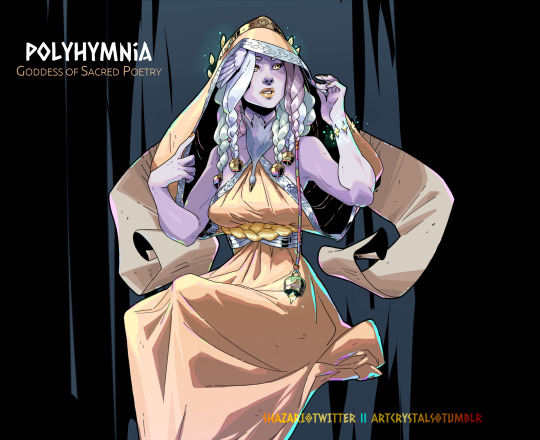
The Nine Muses
Polyhymnia, Goddess of Sacred Poetry
(fan design, ofc)
2K notes
·
View notes
Text
The Nine Muses
This is a very simple post about the Muses in hopes of explaining who they are, what their domains are, and some things they may be able to help with. This post isn't a deep dive by any means - just a simple introduction. Enjoy!
Who are the Muses?
The Muses, or Mousai, are goddesses of inspiration for various creative, scientific, and poetic endeavors. They were believed to also have knowledge of all things that have come to pass, remembering events with clarity that mortals could not hope to have. Their names are Kalliope, Kleio, Ourania, Thaleia, Melpomene, Polymnia, Erato, Euterpe, and Terpsikhore.
In total, there are nine Muses. The god Apollon was often believed to be the leader of the Muses, having a very close connection with them. The goddess Artemis was also paired with them.
Their origin and family varied depending on the source, but the most common notion was that Zeus and Mnemosyne are their parents and that they were born at the foot of Mount Olympus. Some other possible parents are Ouranos and Gaia, Zeus and Plousia, Pieros and Antiope, or even Apollon.
Poets of the past used to invoke the names of the Muses in hopes of gaining inspiration and the ability to gracefully convey their words. When a connection was drawn between them and Apollo, they were also known for their prophetic abilities as well, even being said to teach the art of prophecy.
What are each of their domains?
Kalliope - The eldest of the Muses, she is the goddess of eloquence and epic poetry. She is often considered the mother of Orpheus. She was depicted with a tablet, a scroll, or (later on) a lyre. Her name has been translated to mean "beautiful-voiced".
Kleio - Wise and intelligent, she is named the goddess of history. In art, she was often depicted with an open scroll or chest full of books. Her name was translated as "to make famous".
Ourania - Associated with the stars, she is the goddess of astronomy and astronomical writings. She has been depicted pointing at a celestial globe with a rod, but I wasn't able to find more information on her symbols. Her name means "heavenly one".
Thaleia - A goddess that helps bring joy to the world, she is the goddess of comedy and bucolic poetry. She was also considered to be the mother of the Korybantes (a group of seven demigods). She was often depicted with a comedy mask, a shepherd's staff, or a wreath of ivy. Her name has been translated as "festivity" or "blooming".
Melpomene - Holding a domain more somber than the Muse above, she is the goddess of tragedy. She was named the mother of the Sirens by Apollodorus. She was depicted with a tragedy mask, a sword, a wreath of ivy, or cothurnus boots. Her name likely means "to celebrate with song (and dance)".
Polymnia - With a name meaning "many hymns" or "many praises", it's no surprise that she's the goddess of religious hymns. She was often portrayed in a meditative pose.
Erato - A Muse that needs no introduction, she is the goddess of erotic poetry and mime. She was often portrayed with a lyre. Her name means "lovely" or "beloved".
Euterpe - Likely full of rhymes and reasons, she is the goddess of lyric poetry. She was often depicted with a double flute. Her name likely means "well pleasing" or "giver of much delight".
Terpsikhore - Filled with music, she is the goddess of choral song and dancing. She was often depicted with a lyre and plectrum. Her name has been translated to "delighting in dance".
Kalliope - Speaking presentations, writing essays, script reading, reading/writing informational posts/articles/etc., interpreting poetry, poetry writing/reading, sharing your own poetry, communicating clearly with others, important conversations, coping with conflicts, addressing conflicts, making peace with others.
What are some things they can help with specifically?
***These are merely suggestions.***
Kleio - History exams/tests, studying classics/history, delving into your own history, discovering family history, recalling past events, writing myth retellings or similar, identifying patterns of behavior, releasing the past, learning from the past, finding hope for the future.
Ourania - Studying the stars/space, story-telling, understanding the universe around us, memorizing constellations, finding peace in the night, finding hope in the darkness, creating goals for yourself, "reaching for the stars", holding onto your wishes, finding a sense of direction.
Thaleia - Creating your own joy, finding what makes you happy, performing stand-up comedy, writing any form of comedy, play-writing, healthy positivity, learning to laugh things off, releasing stress/burdens, moving forward, expressing your joy.
Melpomene - Coping with hardships, moving through difficult times, releasing the past, forgiving oneself, coping with past mistakes/regret, healing from difficult events, coping with the "downs" of life, play-writing, telling tragic tales, addressing difficult topics sensitively.
Polymnia - Writing devotional poetry/hymns/songs/etc., growing closer with religion/devotion, inspiration for offerings/devotional acts, coping with religious difficulties, finding comfort/joy in religion, connecting with the divine, religious/spiritual writings, connecting with your practice.
Erato - Love letters, confessing your feelings through writings/songs/etc., connecting with sexuality, writing/reading erotic stories, communicating sexual needs, establishing/discovering sexual boundaries, sex positivity (especially through literature), embracing your sexual interests.
Euterpe - Writing poetry, interpreting poetry, communicating one's emotions, romanticizing life, sharing poetry with others, devotional poetry, expressing one's feelings through writing, processing emotions, finding the "right word" for a piece you're writing.
Terpsikhore - Song-writing, learning to dance, expressing yourself through dance/song, connecting with music, processing feelings with musical aid, instrument playing, choral/instrumental performances, writing a musical, musical theater, finding your voice, embracing who you are, expressing yourself.
334 notes
·
View notes
Text

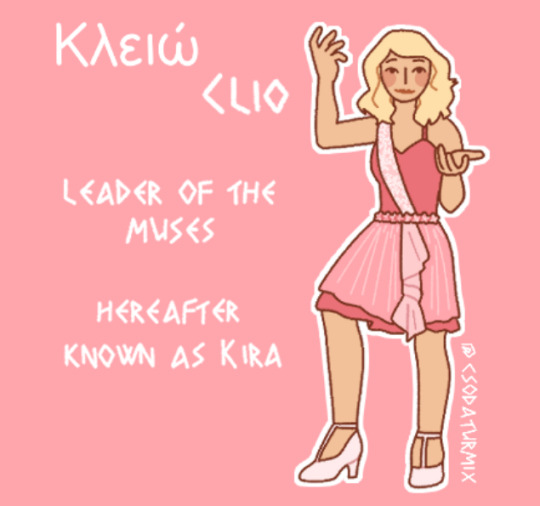
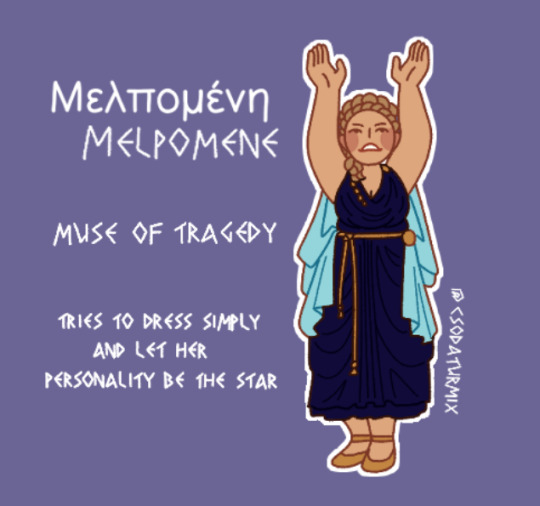


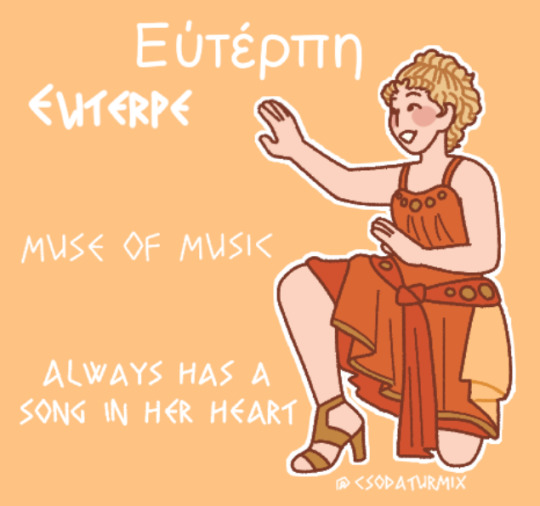



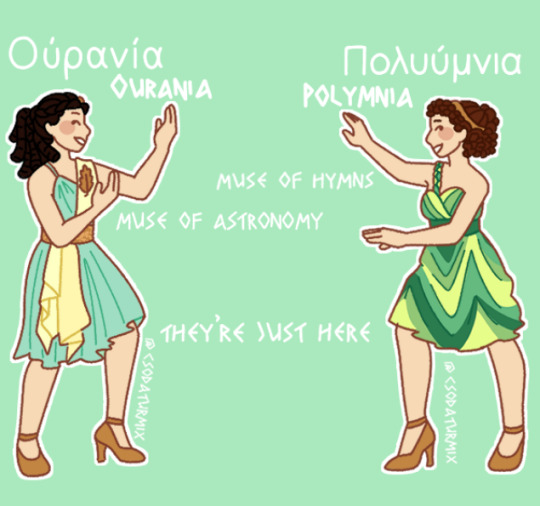
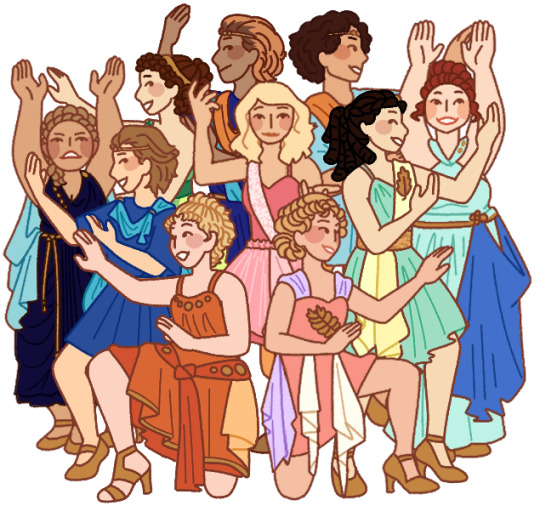
Huzzah!
#the muses#muses#klio#melpomene#calliope#euterpe#erato#terpsichore#thalia#polymnia#polyhymnia#ourania#urania#xanadu#greek mythology#xanadu musical#clio#mousai
294 notes
·
View notes
Text
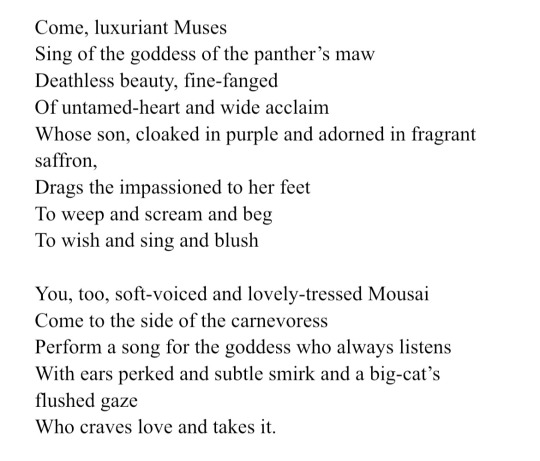
(6 August 2023)
#i did this one at the beach (-:#my poetry#Aphrodite#Aphrodite deity#Mousai#devotional art#helpol#personal#prayer
101 notes
·
View notes
Text
“The Mousai are always dancing, and the goddesses love to busy themselves with songs and strings. But when they see Apollon beginning to lead the dance, they put their heart into their singing even more than before and send down from Helikon an all-harmonious sound.”
- Simonides, Fragment 578 (from Himerius, Orations)
#apollon#apollo#muses#mousai#calliope#terpsichore#clio#urania#polyhymnia#euterpe#thalia#melpomene#erato#greek gods#Simonides#Himerius
62 notes
·
View notes
Text
By Polyhymnia's hand
I weave my prayer
Holiest Muse, may I live to honour the Gods
With actions and words
português:
Pela mão de Polímnia
Teço minha oração
Sacratíssima Musa, possa eu viver para honrar os Deuses
Com cada palavra e ação
68 notes
·
View notes
Text
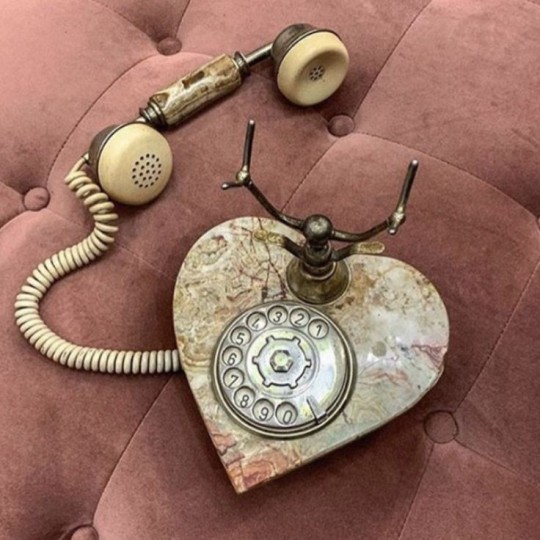
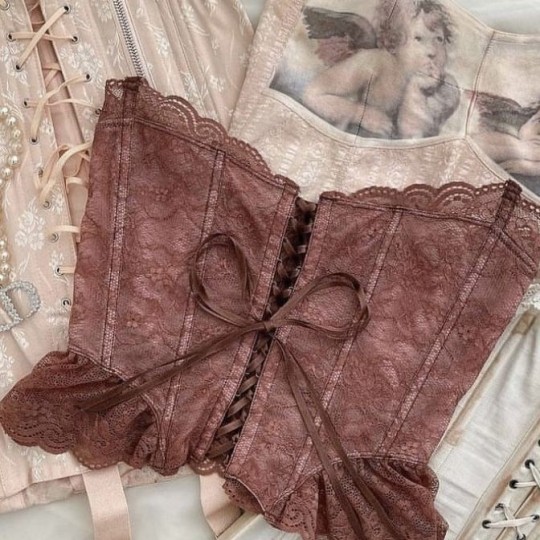
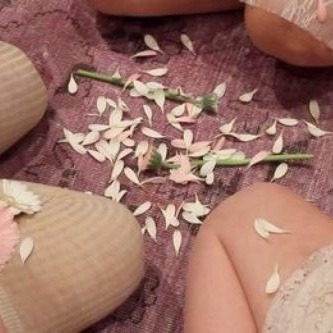
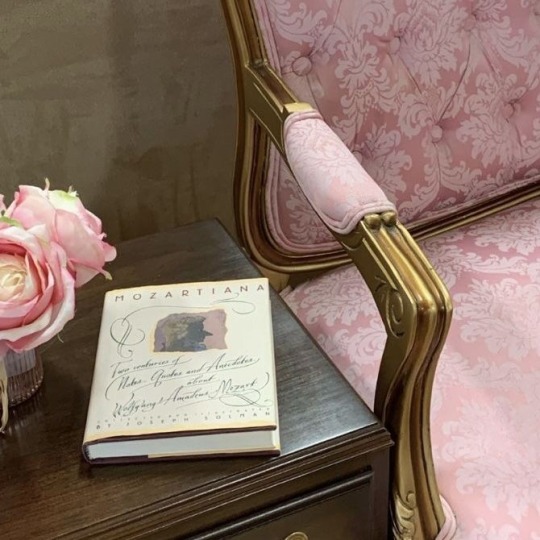
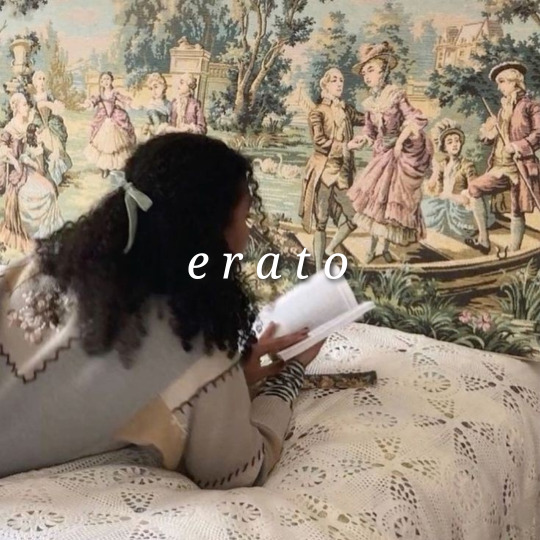
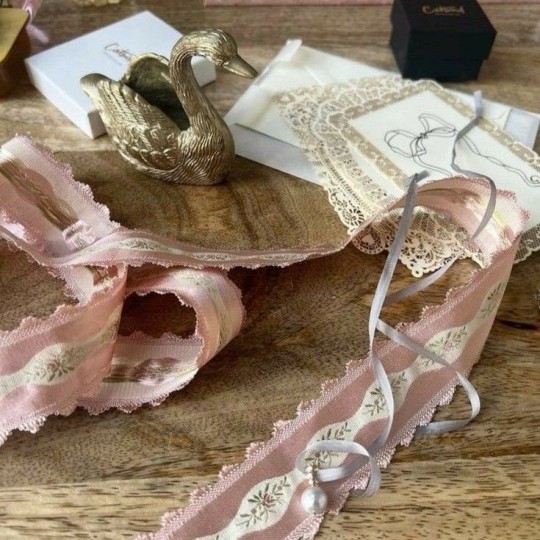
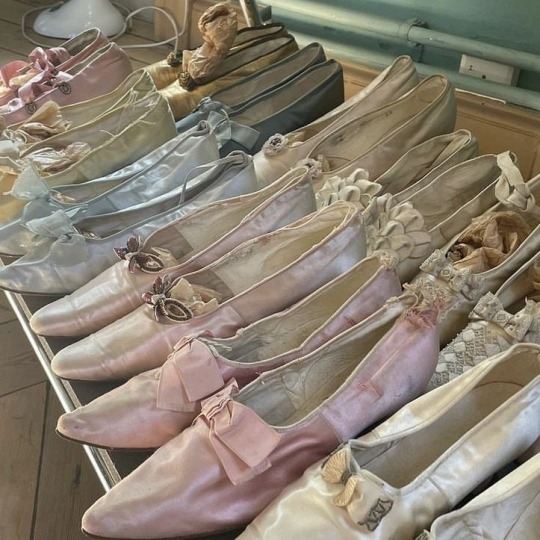
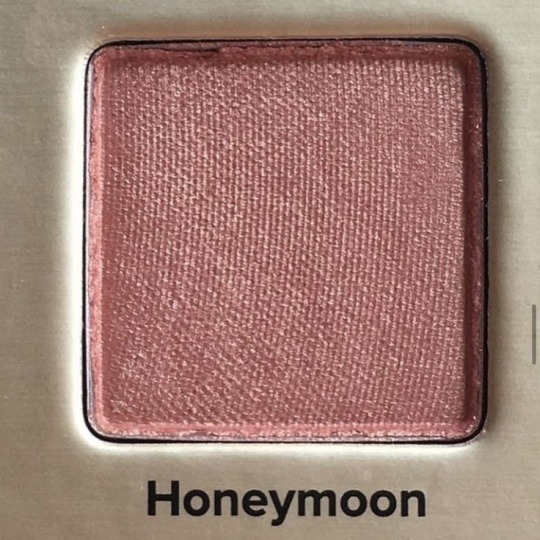
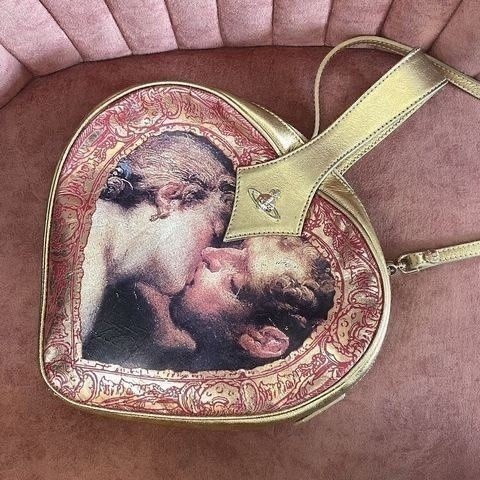
𝒆𝒓𝒂𝒕𝒐 ; 𝒈𝒐𝒅𝒅𝒆𝒔𝒔 𝒎𝒖𝒔𝒆 𝒐𝒇 𝒍𝒐𝒗𝒆 𝒑𝒐𝒆𝒕𝒓𝒚 💖📜
[please reblog or like if you saved]
#erato#mousai#nine muses#greek god#greek gods#greek goddess#greek deity#greek god aesthetic#greek god art#greek pantheon#greek paganism#greek pagan#greek polytheism#greek polytheist#greek myth#greek myth aesthetic#greek myth art#greek mythology#greek mythology aesthetic#greek mythology art#hellenism#hellenistic#hellenic paganism#hellenic pagan#hellenic polytheism#hellenic polythiest#hellenic pantheon#hellenic gods#hellenic deities#9muses
36 notes
·
View notes
Text
Prayer to Djehuty for Artistic Inspiration
Hail and praise onto you, Djehuty, True Scribe of Ma'at!
Oh, Thrice Great of Heka Power, Wise One in Iunu, the Mousa has fled, she prowls a distant land in the form of a lioness!
Bring her back to me, place her on my brow, for I am her father, Ra Horakhety, and I am in need of her.
Render this service to me and I shall make offerings to you on the festivals of the month, the sixth day, the half-month, and all the other festivals appropriate to you, Oh Reckoner of Months, of Days, of Hours.
Bring her to me and you shall receive a thousand loaves of bread, a thousand jugs of beer, a thousand cuts of beef and fowl, and all other things good and pure on which a god lives.
#sharing an originally written prayer in case anyone finds it useful#this is a first experiment in Graeco-Egyptian syncretism#equating the solar eye to The Muses and referencing the distant goddess myth#I specifically call upon Djehuty because I'm a writer#but I think it works well for just general purpose artistic inspiration due to the mythic context#I guess if you're a musician Hathor may work just as well#so that's an option if you want this prayer to be purely Kemetic#kemeticism#djehuty#hellenism#mousai
68 notes
·
View notes
Text
“ Listen to the Music ”
Goddesses of music, song and dance, and the source of inspiration of poets. Goddesses of knowledge, those who remembered all things that have come to pass.
Daughters of Zeus; Calliope, Clio, Melpomene, Euterpe, Erato, Terpsichore, Urania, Thalia, Polyhymnia. The Muses
Calliope - epic poetry
Her name meaning “beautiful-voiced” deriving from the Greek words kallos and ops. Calliope is the Muse of epic poetry. She is also known as the Muse of eloquence.
She is portrayed holding a tablet and stylus or a scroll. In older art, she’s portrayed with a lyre. She is often referred to as “the One with a Beautiful Voice” and named “Chiefest of them all [The Muses]” She is the wisest of the Muses as well as the most assertive according to Hesiod. She is the mother of Orpheus, Linos, Ialmenos, Rhesos, and The Corybantes and is the eldest of the Muses.
Clio - history
Her name deriving from the Greek verb kleô meaning “to make famous” or “celebrate”, Clio is the Muse of history. She is also known as the Muse of poetry.
She is portrayed holding an open scroll or seated beside a chest of books. She is often referred to lyre playing and named “Muse of History” She is the mother of Hyacinthus and Hymenaeus
Melpomene - tragedy
Her name deriving from the Greek verb melpô or melpomai meaning “to celebrate with dance and song”, Melpomene is the Muse of tragedy. She is also known as the Muse of chorus, singing, and musical harmony.
She is portrayed holding a tragic mask or sword and a knife in the other hand, depicted as richly dressed with a serious face. Sometimes wearing an ivy wreath and cothurnus boots. She is said to charm the souls of her listeners with melodia. She is the mother of the Sirens.
Euterpe - lyric poetry
Her name meaning “giver of much delight” deriving from the Greek words eu- and terpô, Euterpe is the Muse of lyric poetry. She is also known as the Muse of music.
Her main attribute was the double-flute. She would entertain the Gods and serve as an inspiration to poets with her influence on liberal and fine arts in Ancient Greece. She is the mother of Rhesos.
Erato - erotic poetry
Her name meaning “lovely” or “beloved” deriving from the Greek word eratos, Erato is the Muse of erotic poetry. She is also known as the Muse of mimic imitation (‘mime’) and lyrical poetry.
She is portrayed with a myrtle and rose wreath, holding either a lyre or a small kithara. She is the mother of Kleopheme.
Terpsichore - choral song and dance
Her name meaning “delighting in dance” deriving from the Greek words terpsis and khoros, (similar to Melpomene) Terpsichore is the Muse of dance. She is also known as the Muse of choral song
She is portrayed with a lyre and plectrum. She lends her name to the word “terpsichorean” which means “of or relating to dance”. She is the mother of Rhesos, Linos, and the Sirens.
Urania - astronomy
Her name meaning “heavenly one”, Urania is the Muse of astronomy. She is also known as the Muse of astrological writings. She is able to foretell the future by the arrangement of the stars.
Her main attributes are the globe and the compass. She is portrayed pointing at a celestial globe with a rod. She is often associated with universal love, power, majesty, beauty and grace. She is the mother Linos and Hymenaeus.
Thalia - comedy
Her name meaning “rich festivity” or “blooming”, deriving from the Greek word thaleia, Thalia is the Muse of comedy. She is also known as the Muse of bucolic poetry.
She is portrayed with the attributes of comic mask, shepherd’s staff, and an ivy wreath. She is the mother of the Corybantes
Polyhymnia - religious hymn
Her name meaning “many hymns” deriving from the Greek words poly and hymnos, Polyhymnia is the Muse of religious hymns. She is also known as the Muse of sacred poetry, dance, eloquence, agriculture, and pantomime.
She is portrayed in a pensive or meditative pose. She’s believed to have made the lyre. It is unclear due to many disbelief. It is not sure if she bore children or had many.
#muses#nine muses#mousai#polytheism#calliope#clio#melpomene#euterpe#erato#terpsichore#urania#thalia#polyhymnia#helpol#little post idea I had to try out#the muses
43 notes
·
View notes
Text
Outros Deuses e Seus Epítetos - As Musas
Olá philoi!
Continuamos nossa série de posts dedicados a falar um pouco sobre os epítetos, culto e aspectos relevantes sobre várias deidades com, dessa vez, um grupo de Deusas bastante relevantes para a tradição cultural helênica: As Musas!
Descritas como as inspiradoras dos poetas, pensadores, historiadores e escritores em geral, as Musas são as patronas de toda sorte de arte antiga. É dito que Pitágoras fazia oferendas de bois quando fazia alguma descoberta na geometria e que poetas antigos faziam oferendas a ela antes de iniciarem suas canções. Vemos invocações às Musas dos mais variados autores e poetas, até a atualidade.
Mais comumente as vemos agrupadas em nove, sendo estas referidas na mitologia como as filhas de Zeus, Rei dos Deuses, e de Mnemósine, a Deusa-titã das memórias e inventora das palavras.
Menos comumente, vemos outros agrupamento de Musas, algumas descritas como filhas de Apolo, outras sendo ainda mais antigas que as filhas de Zeus, sendo filhas de Urano, os Céus, e Gaia, a Terra.
Por fim, seguimos detalhando seus epítetos, nomes e descritores mais comuns em seguida.
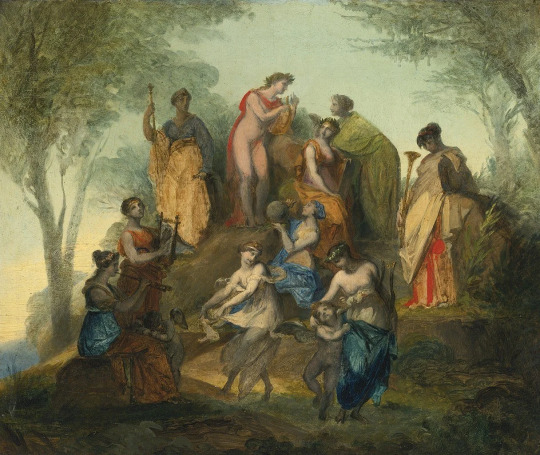
Os locais mais comuns de culto às Musas que temos em registro concerne o Monte Hélicon na Beócia e a Piéria, na Macedônia. Ambas regiões icônicas associadas a mitos de seu nascimento que continham templos para as Musas no passado.
Antes de focarmos em seus epítetos, visto que se trata de um coletivo de deidades, focaremos em seus nomes.
As Nove Musas da Piéria (Filhas de Zeus e Mnemósine)
Chamadas de Piéridas (Em grego Πιεριδες, Pierides), estas Musas são as mais conhecidas e representadas em arte. Filhas da união de Zeus e Mnemósine, seus nomes, significado de cada nome e domínios são:
Calíope, (Bela Voz) musa da eloquência e poesia épica
Euterpe, (Agradável) musa da poesia lírica
Tália, (Festividade, Florescer) musa da comédia
Melpomene, (Celebrar com música e dança) musa da tragédia
Erato, (Amável) musa da poesia erótica e amorosa
Polímnia, (Muitos hinos) musa da literatura sacra e hinos religiosos
Urânia, (Celestial) musa da astronomia e astrologia
Clio, (Glória) musa da história
Terpsícore, (Que se deleita em dançar) musa da dança e dos corais.
Dentre todas as variações deste grupo de deidades, as Nove Musas da Piéria são tidas como as mais conhecidas e têm domínios individuais assinalados a cada uma. Até a atualidade são representadas em obras artísticas ladeando Apolo, deus da luz e das artes em geral, como suas companheiras, amantes (em diversos mitos) e parceiras de domínio.
Em epíteto também são chamadas de Castálides (da fonte da Castália), Helikonides (do Monte Hélicon) ou Parthenoi Helikoniai (Donzelas do Hélicon).
Os epítetos das Musas são bastante relativos a seu local de culto, percebe-se, sendo também chamadas de Olímpiades (do monte Olimpo), Ilisíades (do rio Ilísio) ou Pegasides (do Pégaso, o cavalo alado dito ter criado as fontes do Hipocrene no Hélicon com seus cascos, onde as Musas residiam).
As Musas Titânides (Filhas de Urano e Gaia)
Um agrupamento de Musas descrito pelo antigo poeta espartano Álcman e tardiamente por outros escritores como os romanos Pausânias e Cícero. Seu número entretanto varia entre 3 - 4 Deusas, mas não há consenso geral. Segue abaixo os nomes destas Deusas das artes.
Meletê (Prática) / Mneme (Memória) / Aoide (Canção) / Arkhê (Começo) / Thelxinoe (Encantadora de Mentes)
Autores diferentes agrupavam as filhas de Urano e Gaia entre os nomes acima, sendo válido ressaltar que os fragmentos que relatam os nomes destas Musas Titânides são tão antigos quanto o século 7 AEC (Antes da Era Comum), em torno de um século ou dois após a morte de Hesíodo e Homero.
As Musas Apolônidas (Filhas de Apolo)
Um terceiro agrupamento de Musas também era cultuado na antiguidade, particularmente em Delfos. Estas Deusas das artes seriam filhas do Deus olimpiano da luz, sem mãe atestada nos relatos antigos. Seus nomes vêm em duas variações, seguindo abaixo.
Cêfiso (Do rio Cêfiso) / Apolônis (de Apolo) / Borístenis ([?] + Força)
As três eram chamadas por nomes referentes às notas da lira:
Nete (Nota mais baixa da lira) / Mêse (Nota média da lira) / Hípate (Nota alta da lira)
Independendo de qual grupo de Musas, a todas elas são atreladas o domínio sobre as artes, conhecimento e inspiração para diversos processos onde a mente e a criatividade se enlaçam. Para nossa espiritualidade helênica, sua presença é indispensável, visto que o culto e celebração se fazem usufruindo das artes das Musas - cantando, alegrando-se em hinos e louvores que invocam os Theoi.
É interessante analisar, de um ponto de vista moderno, que as Nove Musas em especial sejam filhas da Memória (Mnemósine) e sejam diretamente atreladas a razão pelas quais muito da cultura helênica antiga chegou a nós. As artes, histórias, poesia e hinos nos informam e educam sobre muito das divindades, sendo um componente essencial na espiritualidade e no ethos helênico.
No mais, as Musas são deidades imprescindíveis e com um domínio vasto. Que Elas continuem a nos inspirar e insuflar as belas artes no âmago de nossos corações. Encerremos o post com seu hino homérico, traduzido por Rafael Brunhara.
Que pelas Musas eu comece e por Apolo e Zeus.
Pelas Musas e pelo flechicerteiro Apolo
homens aedos sobre a terra há e citaredos
e por Zeus reis. Feliz quem as Musas
amam: doce lhes flui da boca a voz.
Salve, filhas de Zeus, e honrai minha canção
Depois eu vos lembrarei também em outra canção.
#mousai#the muses#As Musas#outros deuses#epítetos#epithets#politeísmo helênico#hellenic polytheism#helpol
30 notes
·
View notes
Text
In a well-known excursus in the tenth book of the Geography, Strabo explains the place of music in orgiastic ritual. He distinguishes types of festivals according to the role within them of divine possession, [mousike], and mystic elements. Mystic concealment, he argues, induces reverence, and [mousike] brings us in touch with the divine. Strabo goes on to speak of music as the foundation of education and also as a way of imitating the gods. The Muses themselves, he points out, are goddesses (10.3.10); and the Pythagoreans regarded all music as the work of the gods, teaching that the cosmos was constituted according to the principle of musical harmony. He asserts a common Greek association of "everything orgiastic, Bacchic, choric...and mystic," with Dionysus, Apollo, Hecate, the Muses, and Demeter; he notes choric activity as a feature common to all these cults [...].
Alex Hardie, "Muses and Mysteries"
#alex hardie#muses and mysteries#sacred sound#ancient greece#mysteries#hellenic deities#mousai#apollon#dionysos#hekate#demeter#strabo#the geography#quotes#cosmos#pythagoreanism
9 notes
·
View notes
Text
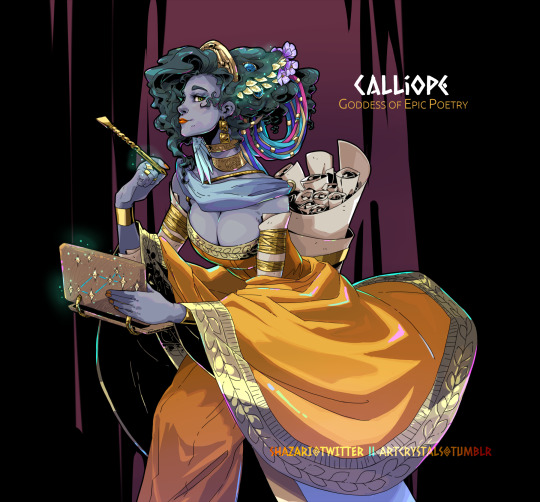
The Nine Muses
Calliope, First of the Muses, Goddess of Epic Poetry
(fan design, ofc)
3K notes
·
View notes
Text
Offering Ideas for the Muses
~ Since I don't see many posts on this topic, I've also included common "general" traditional offerings to the Greek pantheon. I did my best to come up with unique but simple ideas; I wanted to include things that most people could likely offer or do. I hope this list is helpful to someone. ~
Kalliope - Your favorite poetry, poetry books, poetry you wrote, musical instruments, writings you're proud of, devotional writing to her, a handmade scroll with your writing, your favorite pen/pencil, a quill, clay objects (especially tablets), gifts from your siblings (if applicable), imagery of Orpheus, lyre imagery, golden crown imagery. General: Imagery of here, incense (frankincense, patchouli, citrus, etc.), olive oil, olive branch, honey, water, baked goods, wine, rosemary, Orphic Hymn 0 or 75 (can be given to any Muse, but I'll only list it here since Kalliope is thought to be the mother of Orpheus).
Kleio - Any historical or historical fiction books you enjoy, your favorite books (any genre), school notes about history (if applicable), a list of lessons you've learned from the past, a letter of how the past has helped you grow, setting time aside to learn history (anything that interests you), learning about ancient Greece, your favorite bookmark (especially one you frequently use), your favorite quotes. General: Imagery of her, incense (frankincense, patchouli, lavender, etc.), olive oil, olive branch, honey, water, wine, baked goods, rosemary.
Ourania - Star maps, globes, maps of Earth, compasses, dream journals, telescopes, glow-in-the-dark stars, your favorite books about the universe, sci-fi books/shows, seeking knowledge about the unknown, your own art of the stars or space, your own sci-fi writings, solar system imagery, space/star imagery, imagery of your favorite constellation, General: Imagery of her, incense (patchouli, lavender, rosemary, etc.), olive oil, olive branch, honey, water, wine, baked goods, rosemary.
Thaleia - A list of your favorite jokes, a joke book, ivy leaves, an ivy wreath, funny stories/memories from your life, jokes you've written, your favorite comical musical/play/movie/etc., confetti, streamers, a shepherd's (or wooden) staff, comical masks, smiley faces, blooming flowers, sheep imagery, comedy mask imagery. General: Imagery of her, incense (patchouli, rosemary, strawberry, etc.), olive oil, olive branch, honey, water, wine, baked goods, rosemary.
Melpomene - Ivy leaves, an ivy wreath, serious/somber poetry, "vent" art, your favorite tragic musicals/plays/movies/etc., tragic stories you've written, symbols of inner strength/perseverance (whatever that looks like to you), stories about overcoming/growth, therapeutic journaling (I recommend doing this with professional assistance), tragic/sad masks, siren imagery, sword imagery, boot imagery, tragedy mask imagery. General: Imagery of her, incense (frankincense, lavender, cedar, etc.), olive oil, olive branch, honey, water, wine, baked goods, rosemary.
Polymnia - Meditation (if applicable), devotional writings you've written, your favorite hymns/devotional poems, laurel leaves, lustral water, self-made hymns, devotional writings about her, burning non-toxic offerings, fire, prayer journal, imagery of Mount Olympus, imagery of animals you associate with "divine connection" (maybe doves, stags, owls, etc.), imagery of anything you associate with "divine connection" (hands in a praying position, the stars or sky, nature, etc.). General: Imagery of her, incense (rosemary, myrrh, patchouli, etc.), olive oil, olive branch, honey, water, wine, baked goods, rosemary.
Erato - Smut fanfic (that's right, I'll say it), written erotica, your own erotic writing, love letters you've written or received, erotic poetry, setting aside time to explore your, er, "interests", red or pink flowers, jewelry/perfume that makes you feel attractive, sex-positive journaling, basil, myrtle, lyre imagery, sexual imagery, anything you associate with passion/erotica. General: Imagery of her, incense (rosemary, rose, amber, etc.), olive oil, olive branch, honey, water, wine, baked goods, rosemary.
Euterpe - Your favorite poetry, your own poetry, poetry books, sharing your poetry with others, relaxing/calming tea, media that brings you comfort (watching a movie with her, giving her a DVD of your comfort movie, your favorite book, etc.), the lyrics to your favorite songs, imagery of animals/objects that have symbolic meaning to you, imagery of double flutes. General: Imagery of her, incense (patchouli, lavender, myrrh, etc.), olive oil, olive branch, honey, water, wine, baked goods, rosemary.
Terpsikhore - Musical instruments, dancing in honor of her, songs you've written, a devotional playlist, your favorite song lyrics, setting aside time to simply listen to music, your favorite musicals, expressing yourself through song/dance, picks for instruments (guitar picks, lyre plectrums, etc.), sheet music, supporting local/small musicians, learning to play an instrument, lyre imagery, songbird imagery (or any animal you associate with music). General: Imagery of her, incense (patchouli, citrus, strawberry, etc.), olive oil, olive branch, honey, water, wine, baked goods, rosemary.
69 notes
·
View notes
Text
How many Muses?
Given my Greek mythology posts have been sparking some interest lately, I thought: why not bring more to my fellow Greek mythology fans? And so today, what I want to talk about is, the Muses.
A lot of people only know them through the Disney movie “Hercules” - and... of course, you know how faithful to Greek mythology this movie is *cough cough* irony *cough cough*. They did get some things quite right - such as putting the Muses as narrator of the story, that’s a nice and intelligent move. And then... there’s the rest. But let’s put all that aside and take a look at who were truly the Muses.
Note: Muse is the modern, Latinized spelling and saying of the goddesses’ name. In original Ancient Greek, it is “Mousai” (Mousa in singular) (in Latin, “Musa, Musae”).
I) Homeric vs Hesiodic ; and the nine Classical Muses
As usual, what one needs to first do, when looking at a Greek deity, is compare the Homeric and Hesiodic traditions.
Homer, in his Iliad and Odyssey, describes the Muses as the daughters of Zeus. He usually talks of them in plural, and even at one point says there are nine Muses in total - but in other passages of his epic he refers to the Muse, in singular, and treats her as a singular goddess (we’ll come back to this afterward). The Muses are described as singers and music-providers for Olympus, other gods, and half-gods of note. For example they are known to be the one singing alongside Apollo’s music during the divine feasts on Olympos, and when Achilles dies, they are the ones who sing at his funeral. This insistance on the Muses being singing-goddesses is notably carried on by an anecdote Homer tells in The Iliad: it is said that a Thracian man named Thamyris pretended that he was a better singer than the Muses, and could beat them at a singing contest with ease. The Muses heard of his boasting, and angry with him, threw a violent curse at him, removing his beautiful voice AND making him unable to remember any song (or rather turning him into a “singer without memory”). Again, this is an example of the topic of “hubris punished” in Greek mythology: the gods cannot reach the same levels as the gods, as if they pretend they are better than them, they’ll lose everything. If this man had just been happy with his voice and said he was the better singer of all humankind, he wouldn’t have attracted the fury of the Muses - but he had to boast he was better than the “official” singers of the gods...
But beyond singing, Homer also heavily points out that the goddesses are deities of poetry. In the Iliad and the Odyssey, it is made very clear that the bards of Ancient Greece - the aoidoi (insulgar aoidos) - are considered the main servants of the Muse. To be a talented poet, or a talented bard, or even a gifted singer, you must receive the favors and blessing of the Muse, because it is her that offers as much poetic/singing talent as inspiration, to create songs, poems and stories. I keep saying “Muse”, singular, because in the texts of Homer, while the Muses are mostly referred to in plural as characters of the stories (at the feast of the gods, at Achilles’ funeral), whenever they are invoked as the patron of the aoidos, or when Homer himself invokes them, the singular “Muse” is used. Does Homer refer to one specific Muse among the nine, or does he unites and gather all nine goddesses into one singular deity? It is unclear. But what stays is Homer’s famous, iconic lines - his call to the Muse before beginning each of his epic, his plea for her to give him the story he needs to tell, and his thanks for her revealing to him all the secrets of the gods. Because, in these early times of Ancient Greece, the great epics and the great poems were seen as being “offered” by the gods to humanity. Poetic inspiration and poetic talent came from the gods - from the Muses to be exact - and as a result, all those great stories sung by the bards, all the myths and legends of the poets, were offered by the all-knowing Muses to humankind. Without the Muse, a poet, writer, storyteller loses as much his voice as his memory (as the story of Thamyris proves). And this is why Homer invokes the Muse and her blessing before beginning each of his epics.
(And as with providing music for the gods, Apollo also co-worked alongside the Muses when it came to teach humans how to sing and poets which story they should tell)
Now, if we go by the side of Hesiod, we do not have a contradiction (unlike with other deities). Hesiod confirms that all singers, all musicians, all poets own their talents, inspiration and gifts to the Muses and Apollo - without them, there wouldn’t be any form of art on earth. The job of the “servants of the goddesses” is to sing the great deeds of the most valorous and heroic men, and the stories and adventures of the immortal gods - and in doing so, they make people forget their troubles and sorrows... This is the nature of the service of the Muses, according to Hesiod, distract and entertain humanity not in a goal of information, but to ease the hard and difficult life of mortals. The same way Homer called upon the Muse before beginning each of his poem, and regularly asked her to “give” him the stories he was about to sing, Hesiod claims in his Theogony that all he is about to reveal was actually taught to him by the Muses, who appeared to him one day as he was on Mount Helicon. They selected Hesiod, a mere shepherd, a base man part of the lower class of Ancient Greece, and turned him into a glorious poet, into the honored and blessed servant of the gods supposed to tell their deeds for all of eternity. Though, Hesiod slides a very interesting remark in his poem... He mentions that when the Muses appeared to him, they specified that they know many true things that they tell humans... as much as they tell them false things, but worded with such talent and cunning that they appear as they are true. This mention is highly interesting: in the Homeric tradition, the Muses are all-knowledgeable because they are goddesses, and they assisted to most of the events they tell, so there is no doubt that what the goddesses bring to aoidoi are true. However, in Hesiod there is more ambiguity, as the Muses admit they are, just like poets, as much carriers of truth as bringers of lies that are so convincing they appear to be true. [There could be a whole debate on how Ancient Greeks perceived poetry, myths, and all that, but let’s keep things simple].
What Hesiod brings to the table is a lot of additional information that Homer does not give. For example he precises that, beyond Olympos (where they dwell by the side of Zeus, delighting their father with all sorts of stories of the present, the past and the future), they also dwell on the mountain Helikon (the place where Hesiod met them). On this mount, they can be seen dancing, and taking baths in springs, and at night, “veiled with mist”, they sing and praise all of the gods, from Zeus, Hera, Athena and Apollo to Gaia, Okeanos, Selene, Helios, - and many, many more. Hesiod more interestingly specifies the identity and ligneage of the Muses: he explains that they were born of Zeus and of the goddess Mnemosyne, the personification of Memory. It is said that Zeus laid down with Mnemosyne for nine consecutive nights, and that one year afterward the Muses were born, nine daughters “of one mind”, who immediately started singing with their sweet and lovely voices, and quickly went to their father Zeus, at the top of Olympos, where they still dwell to this day. Hesiod also gives each of the nine Muses an individual name: Clio, Euterpe, Thalia, Melpomene, Terpsychore, Erato, Polymnia, Ourania and Calliope.
What is quite interesting is that, in Classical Greece, a consensus and appreciation grew, in literature, poetry, philosophy and culture, that each of the nine Muses represented a different form of art - for each goddess was a specific domain, which would explain why Homer only called upon one specific Muse to sing his poems, since epic poetry would be the domain of one given Muse. This is the list and classification that is the most well-known and widespread today. But, it is present neither in Homer nor in Hesiod. In Homer the goddesses are an unnamed group, and while Hesiod gives them personal identities, he only identifies one division: between Calliope and his sisters. Indeed, Hesiod claims that Calliope is the greatest of the Muse and the leader of the nine, because her domain is to give inspiration and talent to the princes (nobility, royalty, top of the hierarchy). A bit like fairy godmothers, the Muses can take a fancy to a lovely princely baby, and upon his birth place some “sweet dew” upon his tongue, so that his words would be gracious, his judgements always true, his speech sure and his mind wise. And it is watching over those Muse-gifted princes that is Calliope’s job.
Now, I won’t go into great details into this matter more, but here is the “classical” list everybody knows today and that became with time the “traditional” and “by default” categorization of the Muses. Calliope is the Muse of epic poetry (the one that Hesiod and Homer sings, so when Homer calls upon the Muse, he calls upon Calliope). Thalia is the muse of another form of poetry, pastoral poetry, as well as the muse of the genre of the comedy (in theater, because theater is a form of poetry for the Ancient Greeks). She is opposed by Melpomene, who is the Muse of tragedy. Erato is the muse of love poems and lyric poetry as a whole, where Polymnia is the Muse of hymns, sacred poetry and religious songs. Euterpe is the Muse of music (especially flute music), while Terpsichore oversees dancing. And then come two Muses that can surprise someone today because these are thought to be science, not arts, but in Ancient Greece these domains were considered forms of art: Clio, the Muse of historians, and Ourania, the Muse of astronomers.
II) Not nine? The alternate Muses
A text is often brought up when one starts digging into the Muses. A text by Diodorus Siculus: his “Library of History”, written in the 1st century BC (so a VEEERRRYYY long time after Homer and Hesiod). As the title of the text says, it is the work of a historian trying to trace back the origins of the myths, and Diodorus take an interest in the Muses because of their association with Dionysos (this is a novelty of the late centuries of Ancient Greece - apparently the Muses had gained a new connection to the god Dionysos, when before they were just associated with Zeus and Apollo, and Diodorus even says they were paired with satyrs out of all creatures, the satyrs providing the music by instruments while the Muses sang and dance.
Diodorus presents the tradition we best know today: the Muses are nine, and the daughters of Zeus and Mnemosyne. But he also lists several alternative presents in the work of other poets, and that he believes never took off because of how prevalent and dominant Hesiod and Homer’s work were on the myth of the Muses. He notably says that some poets give the Muses a different set of parents: they become more “primordial” deities by becoming the daughters of Gaia, the Earth personified, and Ouranos, the Sky personified - which would make them sisters of the Titans. He also adds that before Hesiod and Homer made the number nine popular for the Muses, there were only three of them. Other details he mentions that were present in his time but not in Hesiod or Homer’s texts are that 1) The Muses apparently discovered letters, and how to arrange them to form words, creating the first poem by doing so. 2) The Muses are eternal virgins - because, as Diodorus suggests, it furthers the allegory of a “pure and uncontaminated education” to reach the peeks of poetry. Though again, in Homer and Hesiod no mention of virginity, discovering letters or hanging out with satyrs. In fact it is quite bizarre to have virgin goddesses partying with satyrs... But by the 1st century BC things had grown very bizarre in Greek mythology. Even weirder of course is the fact that in older texts and legends, Muses were clearly not virgins as Calliope for example was renowned as the mother of Orpheus... It seems the whole “virgin” thing was a very late addition to the myth - as Diodorus says, it seems to mostly exist as an allegory for the “purity of the art” or whatever.
What is very interesting here is the mention that “Before they were nine, they were three...”. It is a topic that has been getting some interests today: the “original trinity” of Muses. At this point things however get a bit complicated and broken down... For example Pausanias, in the second century AD (so long after Diodorus himself), in his “Description of Greece”, claims that the Aloades, Ephialtes and Otos, were the first to honor and sacrifice to the Muses, on the Mount Helikon, and that when they started the cult of the Muses, there were three of these goddesses: Melete, the personification of practice, Mneme, personification of memory, and Aoede, personification of songs. Pausanias however claims that afterward, the original three Muses were changed into the nine we know today. He also mentions an obscure poet of the 6th century BC, Mimnermos, who claimed there were two sets of Muses: an “older” group, born of Ouranos, and a “younger” group daughters of Zeus (and we know by other sources that Mimnermos, like other poets such as Alcman, poets of the 6th or 7th BC century, was one of those poets that attributed the birth of the Muses to Gaia and Ouranos... So from these informations, it seems the Muses were originally three goddesses born of Ouranos and Gaia, elderly deities representing the three parts of art (practicing, memorizing and then singing/performing), but that with time they were “de-volved” into daughters of Zeus, and nine personifications of different types of art.
It is a quite simple and interesting concept... if it wasn’t for other little tidbits that complicate the matter further. For example there are fragments and information about another obscure poet of the 7th or even 8th century BC, from Corinth, who also listed the Muses as three... but as the daughters of Apollo, with different names from the ones listed above, and who were co-worshipped alongside their father at the Delphi sanctuary (you know, Delphoi, where Apollo had his main oracle). The Apollo symbolism seems reinforced by the fact that, according to some sources, these three Muses were named after the three chords of the lyre, the sacred instrument of Apollo: Nete, Mese and Hypate. This was not however their only set of names: the obscure poet I talked above rather gave them the names Cephisso, Apollonis and Borysthenis. Overall it makes sense that in some areas they would be seen as the daughters of Apollo, given how strongly they are associated with him, sharing most of their domains and activities with the god: in fact, one of Apollo’s epithet was “Muse-Leader”, Apollo Mousegetes.
So... it seems yes there might have been originally three Muses - but the idea of these Muses as sisters of the Titans and a primordial trinity of art goddesses was not the only one prevalent in Greece. In Apollo dominated area, they were his daughters and personifications of the music of the lyre.
It is quite poetic however that we still keep the importance of the number three by having still three different sets of Ancient Greek Muses today - the daughters of Zeus, the daughters of Ouranos and the daughters of Apollo. (I know there is a fourth set about four different Muses - but given it was written by Cicero and is part of Roman literature I will gently push them aside, because we focus on Greek things here).
EDIT: I forgot to mention the Homeric Hymns! I didn’t want to put them alongside Homer’s “certified” work like the Iliad of the Odyssey, since too many people make the mistake the Homeric Hymns are authored by Homer “for sure”... Anyway, to add some more info, in the Homeric Hymn to Artemis, it is mentioned that the Muses dance with the Charites at the house of Apollo, at Delphi, and that sometimes Artemis joins to “order” and “lead” the dance. The Homeric Hymn to Apollo however rather presents them, in their “usual” setting, as singing hymns in the “house of Zeus” at the top of mount Olympos (though their song isn’t just about the glory and gifts of the immortals, it also apparently involves describing the suffering, weakness, helplessness and misery of humankind...). Finally, in the Homeric Hymn to Hermes Apollo describes himself not as a master or leader interestingly, but as a “follower” of the Muses of Olympus.
20 notes
·
View notes
Text
I sing of the Mousai,
The nine Muses of the many arts,
Whom Memory had borne by Zeus,
I call upon you, Mistresses of Art.
Clear-voiced Kalliope,
Whose gentle blessings guide the hands of epic poets,
Singing the tales of the divine heroes.
Kleio, holder of great knowledge,
Who knows all of history and ancient times,
Bestowing upon us the lessons of the past.
Euterpe, granter of joy,
Whose soft blessings upon the lyre
And lyrist alike create the most gentle melody.
Joyous Thaleia,
Whose tales bring joy to all,
And end in good cheer and glory.
Melodious Melpomene,
Whose tales of savage, perfectly threaded fate,
Bring us most melancholic pleasures.
Rosy Terpsikhore,
Who graces the earth through
Most captivating dance,
In your nimble steps do you inspire all to move.
Erato, wreathed in roses,
Who sings of the sweetest love
And most passionate desire,
Inspiring words of love and joy.
Holy Polymnia,
With melody as sweet as honey,
Whose name we praise at the start of every song.
Celestial Ourania,
Forever face turned towards the stars above,
Seeking truth and reason, striving for understanding.
O Great Goddesses,
Favour me with your blessed gifts,
Bestow upon me the honour to
Learn from your delicate voices,
So that I may give back to you my praise in every dance and song.
Hail, sweet-voiced Mousai, children of Olympus,
Hail to the glorious patrons of the Arts!
I pray to you and honour your gifts.
E*
#mousai#muses#kalliope#calliope#kleio#clio#euterpe#terpsikhore#terpsichore#erato#polymnia#polyhymnia#ourania#urania#queue#e
248 notes
·
View notes